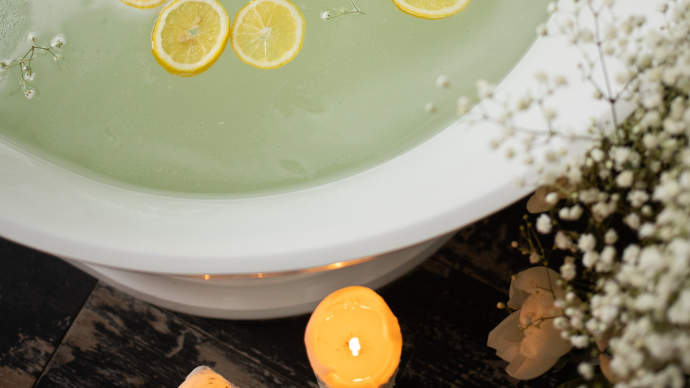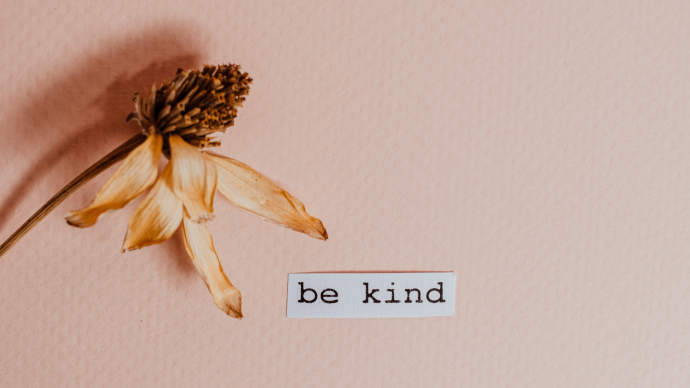Serenity is important for a happy life. Some days we feel like we're on top of things—deadlines, tasks, interpersonal relationships are all going great. Other days are simply neutral, neither great nor terrible.
But then there are days when even getting out of bed can feel like the greatest challenge. It's normal to feel this way once in a while, but if you've noticed it happening more and more lately, then it's probably time to re-assess your everyday habits and make some changes.
Here are some useful life habits and daily routines that might be missing from your patterns. They can really improve your mood if you take them seriously and incorporate them with intention.
1. Drink Water

I promise you, drinking water is a serious game-changer. You've likely heard it plenty of times, but that's because it's really that effective. You need to be hydrated for your body and mind to function properly.
Try to drink between 8 to 12 cups of water per day. Whenever you feel tired, sleepy, negative, or unwell in any way, take it as a sign that you need to get up and down a glass of water, pronto.
Hydration is a key component of a happy, stable mood. Additionally, it helps you to feel more energized and healthy.
2. Keep a Journal

Journaling isn't just for recording your thoughts and making sense of your internal struggles—it's a way to get to know yourself better.
Once you get into a rhythm of daily journaling, it turns into a peaceful ritual of sorts that will improve your well-being.
There are thousands of different ways to journal, with thousands of people out there who can teach you how to do it if you need guidance. The simple method? Get pen and paper, then jot down what you did today and how you feel about all of it.
3. Go on Daily Walks

When you're in a bad mood, you probably just want to curl up under a blanket and forget the world. The last thing you want to do is get up, dress yourself, and leave the house just to walk around!
But it might be the one thing you really need. Going outside, breathing fresh air, walking around, stimulating blood circulation—all of it works wonders for mood improvement.
You don't even have to walk much. Don't think of it as exercise. Just take a circle around the block, or wander the neighborhood for 5–10 minutes. It doesn't take much to reset and refresh.
4. Read Books

Reading isn't easy when you're in a terrible mood or when you're extremely anxious, but it's a great way to wind down and relax if your mood is somewhat negative and you just need a distraction.
Start with something simple or pick a book you already know and love. It doesn't really matter what you read—it's the act of reading a story itself that keeps your mind occupied and diverts stress.
Don't have the time or focus to read books? Consider audiobooks! They offer the same benefits—active mental engagement in a story—but free up your hands so you can drive, do chores, or just close your eyes.
5. Start a Creative Hobby

First things first: it doesn't matter whether or not you're skilled at a given creative hobby. In fact, trying to get better can suck all the mental benefits right out of the activity. Do it poorly and enjoy it anyway.
When you're in a bad mood, few activities are more therapeutic and soul-enriching than exercising creativity.
And you have tons of options: adult coloring books, geeky LEGO sets, brain teaser puzzles, model building kits, dry clay sculpting, tinkering with electronics, among many other possibilities.
6. Watch Movies

Sometimes the only way to feel better when we're struggling with a bad mood is to give in, put on our pajamas, and stand down. If your schedule allows it, pick a film and watch it mindfully.
Avoid movies that are extremely heavy, depressing, and existential. Focus on movies that are known to be hilarious (if you desperately need to laugh) or movies that are cathartic tear-jerkers (if you need to release all that tension that's bottled up inside of you).
7. Listen to Music

Changing the soundscape around you might be enough to feel a little better. Maybe your environment is too silent or too loud. In either case, some uplifting tunes can help you feel better.
I personally think that overtly sad music tends to amplify my already blue feelings and never works as an antidote, so I normally go for something upbeat and soft—ideally groovy, reassuring, and catchy.
8. Eat Bananas, Dark Chocolate, and Berries

There are many types of food known for their health benefits. But did you know that bananas, dark chocolate, and berries are great for when you're in need of a mood boost?
Bananas are rich in vitamin B6, which helps synthesize dopamine and serotonin. Dark chocolate and berries are great allies that work to improve your mood on a micro level.
Chocolate has compounds that release endorphins, which help you to feel better, and berries are full of antioxidants and phenolic compounds that work against stress. Plus, they're all delicious!
9. Drink Tea

It might sound silly, but the simple ritual of drinking tea might help you with your mood. Don't like tea? That's okay! It's not really the tea itself, although tea does have several health benefits.
When it comes to mood, it's mainly the ritual act of sitting down with a hot beverage to enjoy. A cup of tea—or whatever warm beverage you prefer—is a kindness we do to ourselves, and that helps our mood.
If you're prone to stress or anxiety, you may want to lay off the caffeine. In that case, avoid black tea and stick with herbal tea.
10. Sleep and Rest

Our fast-paced, modern society sees napping as a sign of laziness or childishness. And you know what? Sometimes that's true!
But napping offers many health and mental benefits when it's done in a responsible way, so don't throw the baby out with the bathwater.
Sleep deprivation can seriously hamper your brain and body, and it can manifest as bad moods, poor productivity, and physical ailments. If a glass of water doesn't cure your drowsiness, then a nap might be in order.
For best results, you should nap for no longer than 20 minutes. That's just long enough to feel the refreshing effects, but not so long that you enter deep sleep (which can make you groggy for the rest of the day).
11. Maintain Hygiene and Clutter

Of course, showering and getting ready are daily rituals we should already be doing. If you aren't, you should start taking it seriously.
Making yourself presentable on the outside actually has beneficial effects on the inside. When you look better, you feel better.
Conversely, neglecting personal hygiene can have deleterious effects on your physical health, which can spill over and affect mental health.
Beyond your body, you should also take care of your physical environment. A cluttered workstation and/or cluttered home can weigh you down psychologically, even if you aren't aware of it.
Don't have the time or energy to do all of that? Take it one at a time. Instead of cleaning your entire house, maybe clean the table today and the desk tomorrow. If you shower once a week, try twice a week.
12. Talk to Someone Kind

Whether you're introverted or extraverted, we all need human contact at some point. A kind voice can lift the spirit like nothing else. Even just an open conversation about your bad mood can improve it.
Avoid caustic venting about how this person sucks or that thing is so annoying, which can actually exacerbate negative feelings. Instead, focus on your feelings and express them honestly but graciously.
If you don't have anyone in your life who will listen to you, there are online communities you can seek out. Or you can write down your thoughts as a letter to your best friend.
It might feel like a silly thing, but the act of expression—whether verbal or written—can make all the difference in letting go and getting past. Once you can do that, the bad mood should go with it.





